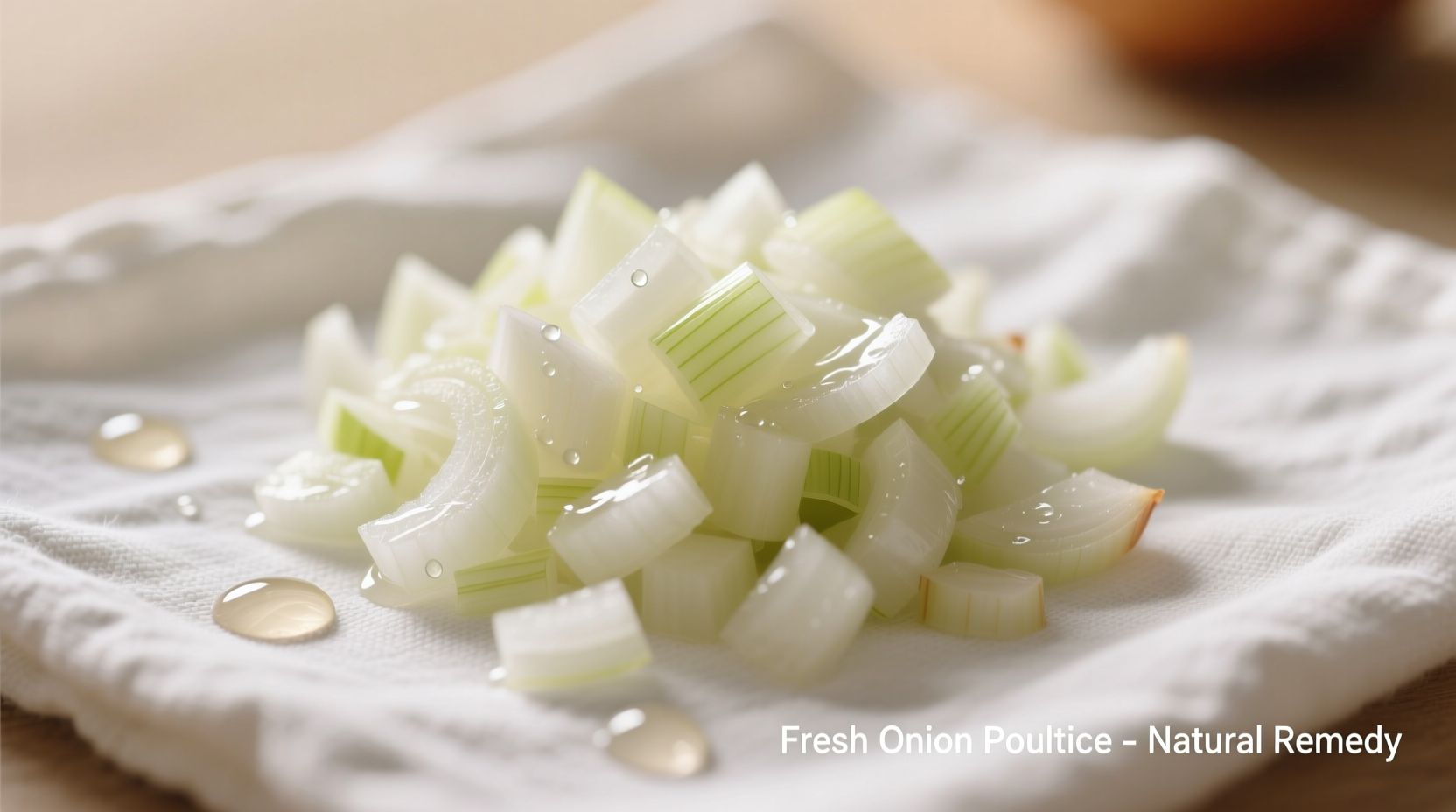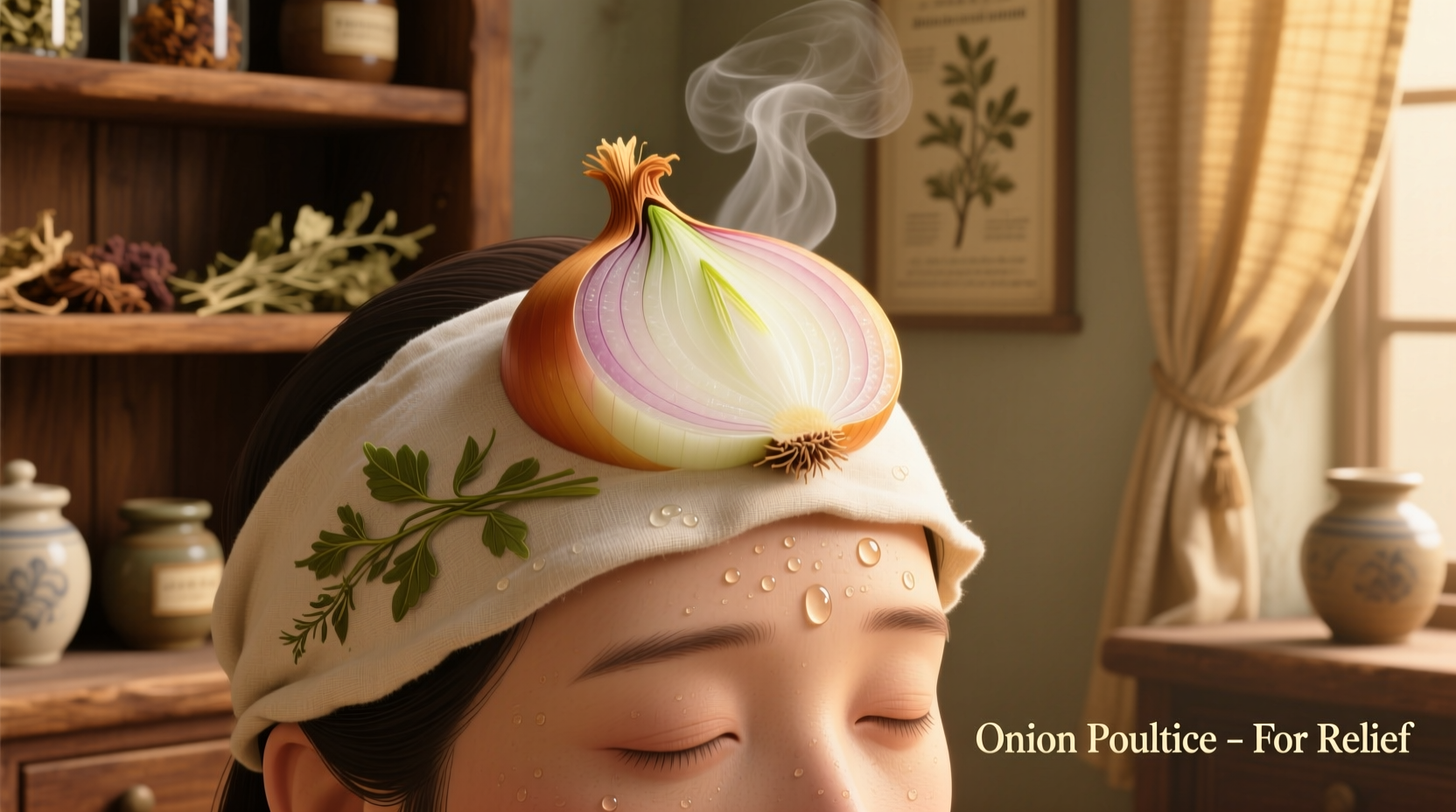What Exactly Is an Onion Poultice and How Has It Been Used Historically?
For generations across multiple cultures, people have turned to onion poultices as a go-to home remedy. This simple preparation involves applying mashed, cooked, or grated onions directly to the skin, typically wrapped in cloth, to address various health concerns. Historical documentation reveals onion poultices were commonly used in 18th and 19th century European and American households for treating everything from respiratory infections to wound healing.
According to records from the U.S. National Library of Medicine, onion-based remedies appeared in medical texts as early as the 1600s. Traditional healers believed onions possessed drawing properties that could pull infection from wounds or reduce inflammation in affected areas.
Understanding How Onion Poultices Work: Traditional Beliefs vs. Scientific Reality
The traditional theory behind onion poultices suggests they work through "drawing" action—pulling toxins, infection, or inflammation from the body. Modern science offers a different perspective. Onions contain quercetin, allicin, and other compounds with documented anti-inflammatory and antimicrobial properties.
| Traditional Claim | Scientific Evidence | Current Medical Perspective |
|---|---|---|
| "Draws" infection from wounds | Limited evidence of antimicrobial properties | May provide minor surface antiseptic benefits but not a substitute for proper wound care |
| Relieves chest congestion | Some evidence of expectorant properties | Possible mild relief but not proven more effective than standard treatments |
| Treats ear infections | No direct evidence for internal ear infections | Not recommended; may cause complications if applied incorrectly |
Research published in the National Center for Biotechnology Information indicates that onion extracts demonstrate antimicrobial activity against certain bacteria in laboratory settings. However, these studies typically use concentrated extracts rather than raw onion applications.
When Might an Onion Poultice Be Appropriate? Understanding Context Boundaries
It's crucial to recognize the appropriate context for using an onion poultice. This traditional remedy has specific limitations that determine when it might be safely considered as a complementary approach:
- Mild, non-serious conditions only - Never use as a substitute for medical treatment of serious infections or conditions
- External application only - Should never be applied to broken skin or open wounds without medical consultation
- Short-term use - Typically limited to 12-24 hour applications
- Not for children under 2 - Due to sensitive skin and potential for irritation
- Not for internal conditions - Despite historical claims, cannot treat internal infections
According to the U.S. Food and Drug Administration, home remedies like onion poultices fall outside regulated medical treatments. The FDA emphasizes that consumers should not rely on such remedies for conditions requiring professional medical attention.
Step-by-Step Guide: How to Make and Apply an Onion Poultice Safely
If you're considering trying an onion poultice for a minor condition, follow these evidence-based preparation steps:
- Prepare the onions: Peel and roughly chop one medium onion
- Cook gently: Simmer onions in 2 tablespoons of olive oil over low heat for 10-15 minutes until soft (do not burn)
- Cool appropriately: Allow mixture to cool to warm (not hot) temperature
- Strain and mash: Remove excess oil and mash onions into a paste
- Wrap properly: Place mixture between two clean cotton cloths to create a compress
- Apply correctly: Place on affected area for no more than 20 minutes at a time
- Monitor closely: Check skin every 5 minutes for irritation or redness
For respiratory support, some apply the poultice to the chest or back. For localized inflammation, apply directly to the affected area. Never apply directly to skin without a cloth barrier, as raw onion can cause chemical burns.

Safety First: Important Precautions When Using Onion Poultices
Despite being a natural remedy, onion poultices carry potential risks that require careful attention:
- Skin irritation: Onions contain compounds that can cause chemical burns with prolonged contact
- Allergic reactions: Some individuals may experience contact dermatitis
- Delayed medical treatment: Relying on home remedies for serious conditions can worsen outcomes
- Inappropriate use: Never use for ear infections by placing near ear canal
The American Academy of Allergy, Asthma & Immunology reports increasing cases of phytophotodermatitis (skin inflammation) from plant-based remedies, including onion applications. Discontinue use immediately if you notice redness, burning, or blistering.
Modern Alternatives and Complementary Approaches
While historical use of onion poultices continues in some communities, modern medicine offers evidence-based alternatives for the conditions they traditionally addressed:
- For respiratory congestion: Saline nasal irrigation and humidified air
- For minor inflammation: Over-the-counter topical analgesics with proven efficacy
- For wound care: Medicated antibiotic ointments and proper cleaning techniques
- For general immune support: Evidence-based approaches like adequate sleep and nutrition
Many healthcare providers acknowledge the comfort value of traditional remedies while emphasizing the importance of evidence-based treatments for actual medical conditions. The psychological comfort of familiar home remedies can complement, but not replace, appropriate medical care.
Final Considerations for Responsible Home Remedy Use
Onion poultices represent just one example of traditional home remedies that have persisted through generations. While they may offer comfort for minor ailments, understanding their limitations is crucial for safe use. Always consult with a healthcare provider before using home remedies for any condition that persists beyond 24-48 hours or shows signs of worsening.
Remember that the most effective approach to health combines respect for traditional knowledge with evidence-based medical care. Documenting your experiences with home remedies can help you and your healthcare provider make informed decisions about what works best for your individual health needs.











 浙公网安备
33010002000092号
浙公网安备
33010002000092号 浙B2-20120091-4
浙B2-20120091-4